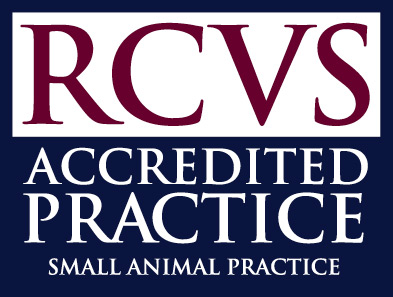It seems strange to be writing a festive article when my son is rampaging around the house in an eye damagingly bright orange “pumpkin T-shirt” in preparation for Hallowe’en! However, there are already Christmas displays in shops and adverts on the television so it’s not too hard to get into the Christmas mind-set. In fact, from the pet perspective, there are a couple of parallels between Hallowe’en/Bonfire Night and Christmas/New Year which are worth being aware of:
“Dietary Indescretion” or eating the wrong thing:
“Trick or Treating” means plenty of sweets around for dogs to steal. While I’m sure eating a whole pack of Haribo starmix is not great for the digestive system, if you are a dog, it’s chocolate that presents a danger. Without fail we always see several dogs over the festive period who have managed to “source” some contraband chocolate. Whether this is the more enterprising pooch who has opened a present under the tree or just an opportunist who has snaffled something from the table, chocolate can be poisonous to dogs and if yours has managed to seize some confectionary related plunder, then it’s best to seek veterinary advice. If you have a young cat, watch out for games with tinsel – if swallowed, it can cause a nasty intestinal obstruction which requires surgical intervention to resolve.
Other toxins which are more likely to be encountered around Christmas or in Winter are:
· Grapes and Raisins – which can cause severe renal failure in some dogs, while others can eat a whole bunch with no consequences.
· Anti-freeze – The sweet taste makes antifreeze tempting for cats, but again it is very toxic to the kidneys and unless treatment is given very quickly, the outcome is often fatal.
· Macadamia nuts – often around at Christmas, they are toxic to some dogs and cause depression, vomiting and an elevated heart rate.
Fireworks:
Fireworks are much more prevalent around Bonfire night, but tend to have a revival during the festive period as well. Many pets find the loud bangs and flashes very stressful and we see many pets for this reason. We have a variety of treatment options available:
· “desensitisation” CDs which play a recordings of fireworks to allow your pet to get used to them
· Natural calming medications are available over the counter without prescriptions and take the form of pheromone sprays, diffusers and collars, or oral medications are available.
· Prescription medications are sometimes required for those pets which are unresponsive to the above and work to reduce anxiety sometimes accompanied by a mild sedative effect.
Hopefully the above will make for a happy, incident free Christmas for your pet! However, if you do have any concerns then please contact us. Often we can advise you over the phone, although sometimes a visit to the surgery is required. Merry Christmas from everyone at Hawthorn Vets!



